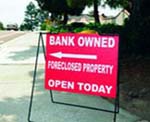
Bank owned properties may look tempting, but would-be buyers face numerous pitfalls.
Buyer Beware
There’s no question that prices on foreclosures and short sales sound attractive. Increasingly, however, buyers are becoming disillusioned by the lengthy and convoluted process required to finance such purchases and by expensive and unanticipated repair costs caused by neglect and outright vandalism.
There are many reasons to buy a new home versus a foreclosure or a short sale, say experts.
First, new homes are protected by warranties, meaning there’ll be no unpleasant surprises in case flaws are discovered in workmanship or mechanical systems.
By law, conventional sales on new or resale homes require full disclosure of any problems with the property and the seller can be held liable if a problem arises as a result of an issue that wasn’t fully disclosed at the time of the sale.
With foreclosures, however, it’s always a “buyer beware” situation. When you buy a foreclosed home, you have no recourse against the seller if there are construction defects, environmental hazards or problems of any kind.
The fact is, many owners stop caring for their homes when they realize that foreclosure is imminent. Others go so far as to damage their homes before vacating.
While blatant damage is easy to see, other less obvious problems, such as mildew, can arise when a home sits vacant for a long period of time and is not maintained. And the buyer is responsible for repairs.
“I looked at a lot of foreclosures,” says Nicole, a 27-year-old first-time buyer who asked that her last name not be used. “The condition on most of them was just horrible. Cabinets were stripped off the walls. Fixtures were gone. Once you factored in the cost of repairs, it just wasn’t worth it.”
In addition to the investment required to make a neglected home habitable, the price of a foreclosure can be pushed up by multiple offers.
Increasingly, buying and selling foreclosures is becoming the province of professional investors, not people who actually intend to occupy the homes. That means the price at which a property sells is often significantly higher than the price at which it was offered.
And banks will insist that repairs be made as a condition of obtaining a mortgage loan. If these costs are included in the loan amount, you could find yourself paying as much for a damaged home as you would have paid for a comparable new home in pristine condition.
Short sales are different from foreclosures, but they have their own set of challenges.
A short sale occurs when a homeowner who wants to avoid bankruptcy or foreclosure gains lender approval to sell his or her home for less than they owe.
In such cases, the lender calls the shots. Even if the owner accepts your offer, obtaining lender approval is a time-consuming process that can take several months. So short sales require time, patience and may result in disappointment since lenders frequently re-ject offers that are below market value.
Still, new-home builders have responded to the competitive challenge that foreclosures and short sales represent.
Many offer incentives such as below-market financing or help with closing costs, which can save thousands of dollars and make it easier to qualify.
Plus, in addition to warranties, new homes are equipped with the latest leading-edge technology in terms of energy efficiency and eco-friendliness. And because you’re purchasing directly from the builder, closings can take place quickly.
Of course, the ultimate benefit of buying new is having the opportunity to make the home truly yours. In many cases you’ll be able to customize your home, selecting items such as cabinetry, countertops, and flooring.
Rather than making due with someone else’s choices, you have the advantage of living in a home and a neighborhood that truly reflects your taste, lifestyle and personality.
The reality is, it’s a great time to buy a new home. Prices are down, interest rates are extremely attractive and the selection of available homes couldn’t be better.
If you’re a risk-taker or an investor, a foreclosure or even a short sale could be right for you. But for most people, when making an investment as significant as a home purchase, the bottom line is peace of mind.
Why Buy New?
> New homes have warranties, which means many repairs are covered.
> New homes use up-to-date “green” materials and technologies.
> New homes can be customized to suit your taste and lifestyle.
> New homes are easier to finance and often feature builder incentives.
